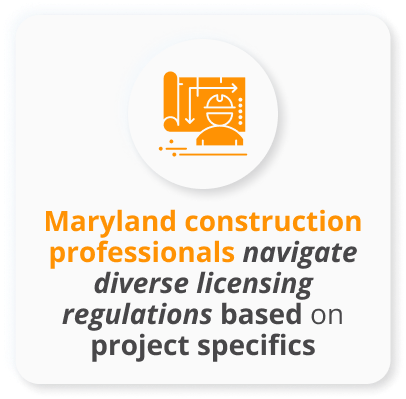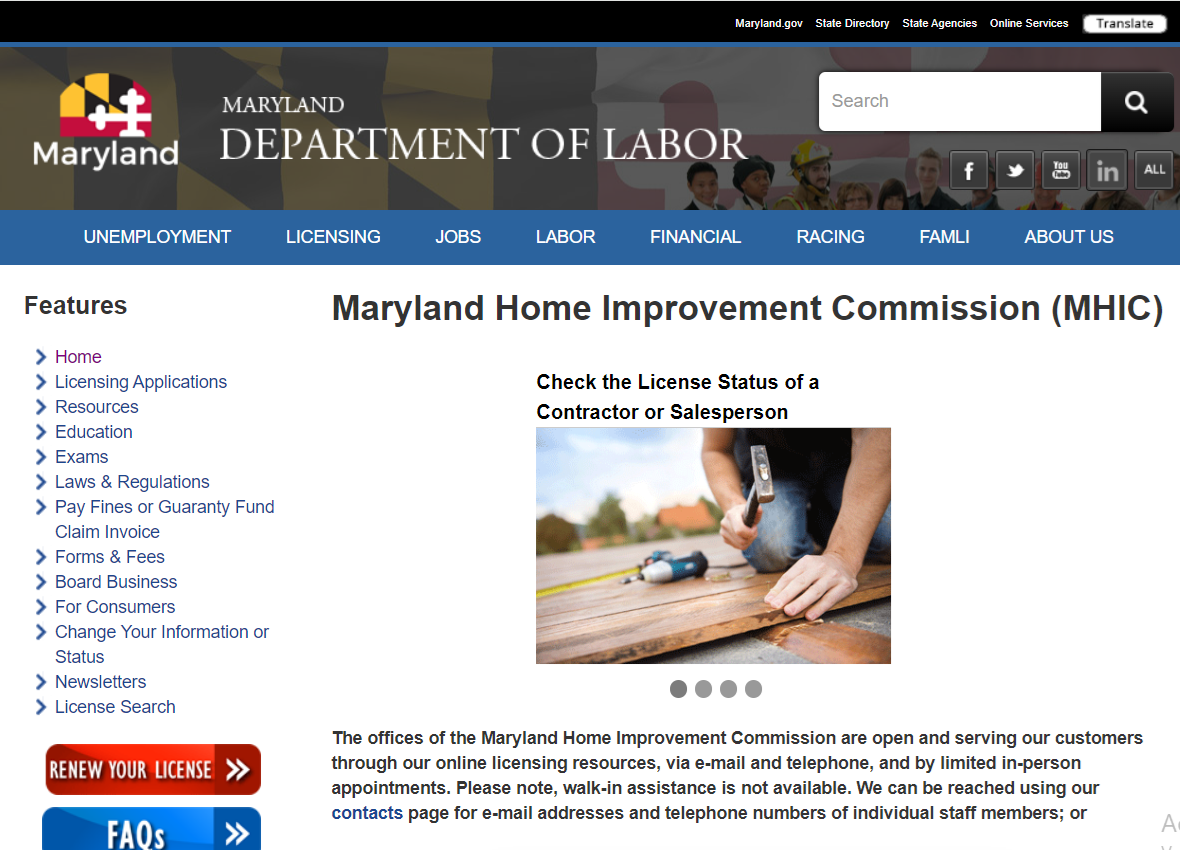Maryland contractor licensing and insurance: Your passport to building a successful and compliant business. Get Your General Contractor License in Maryland.
Professionals in the construction industry in Maryland must navigate the complexities of contractor licensing, which is a critical step. The state has regulations that are designed to ensure that contractors are adequately prepared for the unique demands of their projects. It is essential to comprehend these requirements since they differ significantly depending on the type and value of the work involved. Get Your General Contractor License in Maryland.
For contractor licensing information in Maryland, here are the key details:
Maryland Home Improvement Commission (MHIC)
Web: Maryland Home Improvement Commission
Alternate Phone Number: 512-463-6599 (For calls outside Texas)
Alternate Phone Number: 512-463-6599 (For calls outside Texas)
Phone: (410) 230-6309
Alternate Phone Number: 512-463-6599 (For calls outside Texas)
Alternate Phone Number: 512-463-6599 (For calls outside Texas)
Address:
Main Office: 500 N. Calvert Street, Room 306, Baltimore, MD 21202
For more information, visit: Maryland Home Improvement Commission
The Importance of Licensing for General Contractors in Maryland
The significance of obtaining the correct license in Maryland cannot be overstated. It’s not just a formality; it’s a cornerstone of professional practice in the construction industry. Here are a few reasons why:
- Ensures Compliance: Licensing is a testament to a contractor’s commitment to adhering to state and local regulations and safeguarding against legal and financial risks.
- Demonstrates Credibility: A license acts as a seal of professionalism and reliability, indicating that the contractor has met the required standards of skill and knowledge.
- Builds Consumer Confidence: In an industry where trust is paramount, a license is a reassuring sign to clients that they are dealing with a qualified professional who is recognized by state authorities.
- Enhances Safety and Quality: Licensed contractors are more likely to be up-to-date with building codes and safety protocols, ensuring higher standards of workmanship and safety on the job.
- Facilitates Insurance and Bonding: Many insurance and bonding companies require contractors to be licensed. This not only protects the contractor’s business but also provides peace of mind to clients.
Licensing for Residential Work in Maryland
New Home Construction: Understanding Registration with the Home Builder Registration Unit
In Maryland, while no state license is required for new home construction, registration with the Home Builder Registration Unit is mandatory. This requirement plays a crucial role in maintaining quality standards and protecting consumer interests in new home developments. Get Your General Contractor License in Maryland.
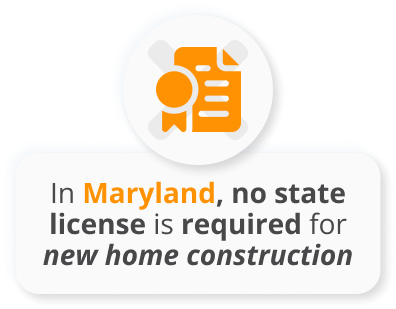
- Registration Process: Builders must complete a registration process which includes providing detailed information about their business and past construction projects.
- Consumer Protection Emphasis: The registration aims to safeguard the interests of homebuyers by ensuring builders meet specific operational standards.
- Compliance with Regulations: Registered builders must comply with Maryland’s Home Builder Guaranty Fund, which offers recourse to consumers in cases of builder insolvency or breach of warranty.
Existing Residential Property Work: Requirements for the Maryland Home Improvement Contractor’s License (MHIC)
Contractors working on existing residential properties in Maryland are required to obtain the Maryland Home Improvement Contractor’s License (MHIC), a critical credential that validates their expertise in home renovation and improvement.
- License Eligibility: To be eligible for an MHIC license, contractors must demonstrate knowledge and experience in home improvement practices.
- Examination Requirement: Applicants are typically required to pass a written exam that covers areas such as home improvement law, general business competency, and safety standards.
- Insurance Requirements: Contractors must also secure general liability insurance, a key element in safeguarding their business and clients.
Home Improvement Projects: Navigating MHIC Licensing
For home improvement projects, the MHIC license is not just a legal requirement but also a mark of professionalism and trustworthiness in the industry.
- Scope of Work: The MHIC license covers a broad range of home improvement activities, including remodeling, altering, repairing, or replacing residential property.
- Consumer Assurance: Holding an MHIC license assures homeowners that the contractor they are engaging with adheres to the state’s standards for safety, quality, and ethical business practices.
- Renewal and Compliance: MHIC licenses require periodic renewal, and contractors must stay updated with any changes in regulations or requirements to maintain their licensing status.
Commercial Work Licensing in Maryland
City/County Level Registration: Essential Steps for Commercial Projects
In Maryland, commercial construction projects often require contractors to be registered or licensed at the city or county level. This localized approach ensures that contractors meet the specific standards and regulations pertinent to the area where they operate.
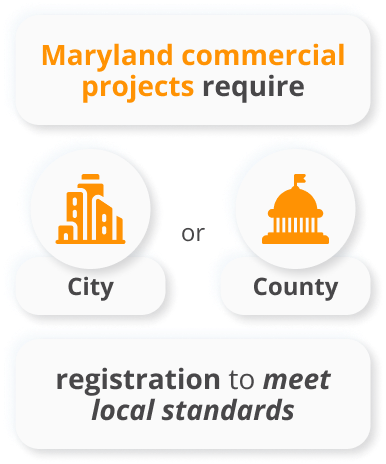
- Local Regulations: Each city or county in Maryland may have its own set of requirements and processes for contractor registration. It’s important for contractors to familiarize themselves with these local regulations.
- Registration Process: Typically, contractors must provide business information, proof of insurance, and sometimes evidence of experience or expertise in the commercial construction field.
- Permits and Compliance: In addition to registration, contractors may need to obtain specific permits for their commercial projects. Ensuring compliance with local building codes and safety regulations is crucial.
Specialized Commercial Work Licensing: New Construction, Excavating, Curbing/Paving Licenses
Certain types of commercial construction work in Maryland, such as new construction, excavating, curbing, and paving, may require specialized licenses. These licenses are often issued by the Clerk of the Circuit Court in the contractor’s respective county. Get Your General Contractor License in Maryland.
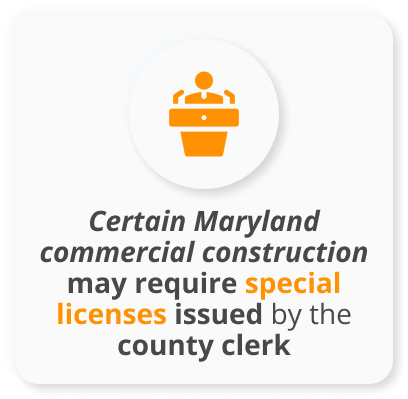
- New Construction Licensing: For large-scale new construction projects, contractors may need to demonstrate specific qualifications or experience.
- Excavating and Curbing/Paving: These specialized areas often require contractors to have additional knowledge and skills, ensuring safe and high-quality work.
- Application Process: The process for obtaining these licenses typically includes submitting an application, paying a fee, and sometimes passing a trade-specific examination.
Essential Insurance Policies for Maryland Contractors
General Liability Insurance: Protecting Your Business from Liability Risks
General liability insurance is indispensable for contractors in Maryland. It provides crucial protection against claims that can arise during construction activities.
- What It Covers: This insurance typically includes coverage for property damage, bodily injuries to third parties, and advertising injury claims.
- Risk Management: It helps manage risks by covering the costs associated with lawsuits and settlements.
- Client Assurance: Many clients require proof of general liability insurance before contracting for services, making it essential for securing projects.
Workers’ Compensation: Ensuring Employee Safety and Compliance
Workers’ compensation insurance is another key requirement for Maryland contractors, particularly those with employees.
- Employee Coverage: This insurance covers medical costs and a portion of lost wages for employees who get injured or become ill due to their job.
- Legal Requirement: In Maryland, contractors with employees are generally required to carry workers’ compensation insurance.
- Protecting Your Business: Apart from being a legal necessity, it protects your business from legal complications and financial liabilities associated with workplace accidents.
Additional Insurance Considerations: Professional Liability, Property Insurance, and More
Contractors should also consider other types of insurance, depending on their specific business needs and the nature of their projects.
- Professional Liability Insurance: Also known as errors and omissions insurance, it covers claims related to mistakes or negligence in professional services provided.
- Property Insurance: For contractors who own or lease a physical business space or have valuable equipment, property insurance can provide coverage for property damage due to events like fire, theft, or natural disasters.
- Vehicle Insurance: If using vehicles for business purposes, commercial auto insurance is necessary to cover risks associated with vehicle operation.
- Umbrella Insurance: This policy provides additional coverage beyond the limits of other insurance policies, offering an extra layer of protection.

Surety Bonds for Maryland Contractors
In Maryland, acquiring a surety bond is often a necessary step for contractors as part of their licensing process. The kind and amount of the bond required will vary based on the contractor’s work type and the project’s size. Here is an overview:
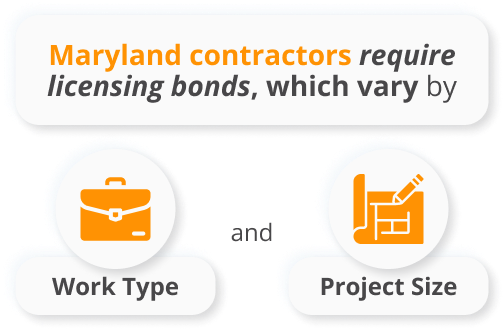
Types of Surety Bonds for Maryland Contractors:
- MHIC License Bond: Contractors engaging in home improvement work in Maryland must secure a $20,000 bond. This bond is crucial to protect homeowners from financial loss if the contractor does not fulfill the contract terms or engages in fraudulent activities.
- Commercial Contractor Surety Bond: The required bond value here fluctuates according to the project’s nature and value. Common bond types include:
- Bid Bond: Ensures the contractor commits to the contract at the bid price upon winning the bid.
- Performance Bond: Assures completion of the project in alignment with the agreed-upon plans and specifications.
- Payment Bond: Ensures payment to subcontractors and suppliers for their contributions and materials.
The Application Process for Maryland Contractor Licenses
Application Steps for MHIC License: A Detailed Walkthrough
The Maryland Home Improvement Contractor’s License (MHIC) is crucial for contractors engaging in home improvement projects. Here’s how to apply:
Ensure you meet the prerequisites, including experience and knowledge in home improvement.
Complete the required pre-license course provided by an approved education provider.
Obtain and fill out the MHIC license application form, available on the Maryland Department of Labor website.
Gather necessary documents, including financial statements, proof of insurance, and evidence of experience or expertise.
Schedule and pass the MHIC exam, which tests knowledge of home improvement law, business practices, and construction standards.
Submit the completed application, supporting documents, and required fees to the Maryland Department of Labor.
Undergo a criminal background check, as required for all MHIC license applicants.
Registering with the Home Builder Registration Unit: Procedure and Requirements
For new home construction, registration with the Home Builder Registration Unit is mandatory in Maryland.
- Application Form: Access the registration form on the website of the Maryland Attorney General’s Office.
- Documentation: Prepare necessary documents, including a list of past home building projects and any subcontractor information.
- Fee Payment: Determine the applicable registration fee and make the payment along with your application.
- Guaranty Fund Contribution: Depending on the type of home builder, contribute to the Guaranty Fund, which offers protection to homebuyers.
- Submit Application: Send the completed application, documentation, and fees to the Home Builder Registration Unit.
Commercial Licensing: Understanding the Application Process at City/County Levels
Commercial contractor licensing varies significantly across different cities and counties in Maryland.

Local Regulations Research
Each locality has its own set of requirements for commercial contractors. Begin by researching the specific regulations in the area where you plan to work.

Application Form and Requirements
Obtain the necessary application form from the local government office or website. Ensure you understand all the requirements, which may include specific examinations, financial statements, and insurance requirements.

Documentation Preparation
Collect all required documents, which could include business information, proof of experience, and evidence of financial stability.

Fee Payment and Submission
Complete the application form, pay any applicable fees, and submit your application to the designated local authority.
Frequently Asked Questions (FAQ)
These are common questions about General Contractor License in Maryland.
Yes, Maryland requires contractors to have appropriate licenses or registrations for most types of construction work, including residential and commercial projects.
The MHIC License Bond, set at $20,000, is mandatory for contractors performing home improvement work in Maryland. It safeguards homeowners against financial losses due to incomplete work or fraudulent practices by the contractor.
Yes, commercial contractors in Maryland may need different types of surety bonds, like bid bonds, performance bonds, and payment bonds, depending on the project’s nature and value.
Holding a surety bond increases your credibility with clients, allows access to larger projects that require bonded contractors, and provides financial protection against client claims.


